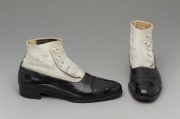Difference between revisions of "Patent leather"
Jump to navigation
Jump to search
(username removed) |
|||
| (3 intermediate revisions by 2 users not shown) | |||
| Line 1: | Line 1: | ||
| − | [[File:1979.70a-SC14032.jpg|thumb|]] | + | [[File:1979.70a-SC14032.jpg|thumb|Men's boots<br>MFA# 1979.706]] |
== Description == | == Description == | ||
| − | Leather with a very hard, shiny enamel finish. While patent leather was recorded as used in the 18th century, commercial manuafacturing first began in 1819 using a process developed by Seth Boyden. The high gloss surface is made by coating the leather with several thin layers of colored varnish. The finish is polished between each coat with [ | + | Leather with a very hard, shiny enamel finish. While patent leather was recorded as used in the 18th century, commercial manuafacturing first began in 1819 using a process developed by Seth Boyden. The high gloss surface is made by coating the leather with several thin layers of colored varnish. The finish is polished between each coat with [[pumice|pumice]]. The varnish may contain [[shellac|shellac]], [[linseed%20oil|linseed oil]], [[cellulose%20nitrate|cellulose nitrate]], and/or [[polyurethane|polyurethane]]. Patent leather is used for shoes, purses, belts, carriage covers, and helmets. Imitation materials, such as [[poromeric%20imitation%20leather|poromerics]], are entirely made of plastic. |
== Synonyms and Related Terms == | == Synonyms and Related Terms == | ||
| Line 8: | Line 8: | ||
charol (Esp.) | charol (Esp.) | ||
| − | == | + | == Resources and Citations == |
| − | * | + | * G.S.Brady, ''Materials Handbook'', McGraw-Hill Book Co., New York, 1971 Comment: p.448 |
| − | * | + | * Hermann Kuhn, ''Conservation and Restoration of Works of Art and Antiquities'', Butterworths, London, 1986 |
| − | * | + | * Matt Roberts, Don Etherington, ''Bookbinding and the Conservation of Books: a Dictionary of Descriptive Terminology'', U.S. Government Printing Office, Washington DC, 1982 |
| − | * | + | * Marjory L. Joseph, ''Introductory Textile Science'', Holt, Rinehart and Winston, Fort Worth, TX, 1986 |
| − | * | + | * Edward Reich, Carlton J. Siegler, ''Consumer Goods: How to Know and Use Them'', American Book Company, New York City, 1937 |
| − | * | + | * American Leather Chemists Association Glossary at www.leatherchemists.org |
| − | * Wikipedia | + | * Wikipedia: http://en.wikipedia.org/wiki/Patent_leather (Accessed Nov. 9, 2005) |
[[Category:Materials database]] | [[Category:Materials database]] | ||
Latest revision as of 12:44, 17 August 2020
Description
Leather with a very hard, shiny enamel finish. While patent leather was recorded as used in the 18th century, commercial manuafacturing first began in 1819 using a process developed by Seth Boyden. The high gloss surface is made by coating the leather with several thin layers of colored varnish. The finish is polished between each coat with Pumice. The varnish may contain Shellac, Linseed oil, Cellulose nitrate, and/or Polyurethane. Patent leather is used for shoes, purses, belts, carriage covers, and helmets. Imitation materials, such as poromerics, are entirely made of plastic.
Synonyms and Related Terms
charol (Esp.)
Resources and Citations
- G.S.Brady, Materials Handbook, McGraw-Hill Book Co., New York, 1971 Comment: p.448
- Hermann Kuhn, Conservation and Restoration of Works of Art and Antiquities, Butterworths, London, 1986
- Matt Roberts, Don Etherington, Bookbinding and the Conservation of Books: a Dictionary of Descriptive Terminology, U.S. Government Printing Office, Washington DC, 1982
- Marjory L. Joseph, Introductory Textile Science, Holt, Rinehart and Winston, Fort Worth, TX, 1986
- Edward Reich, Carlton J. Siegler, Consumer Goods: How to Know and Use Them, American Book Company, New York City, 1937
- American Leather Chemists Association Glossary at www.leatherchemists.org
- Wikipedia: http://en.wikipedia.org/wiki/Patent_leather (Accessed Nov. 9, 2005)
